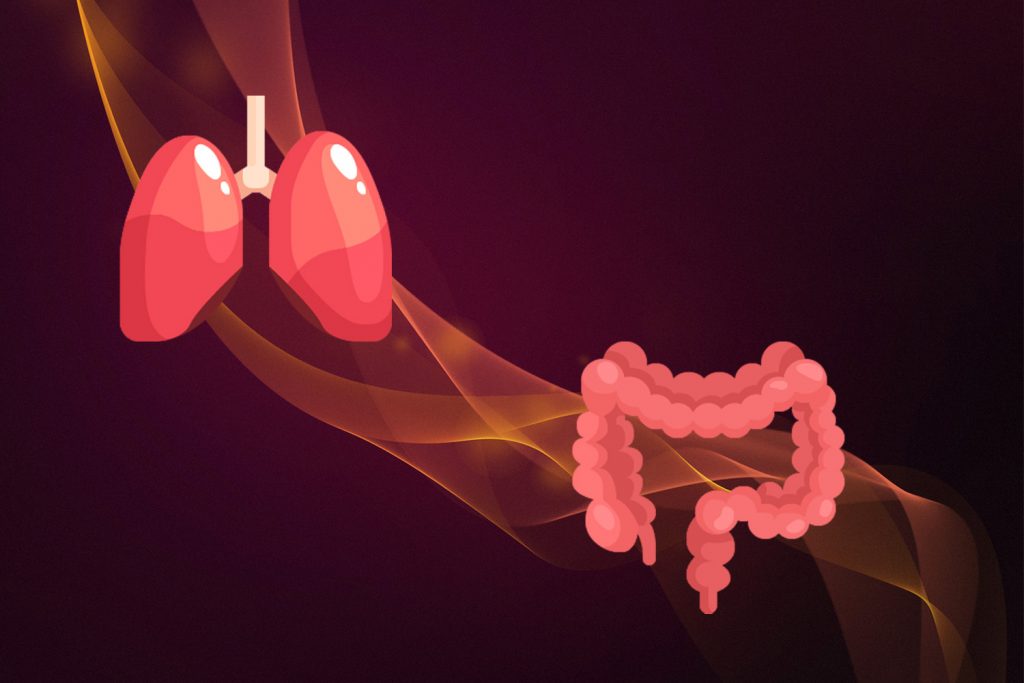13 Jul The gut-lung axis during dysbiosis

The gut microbiota is a complex, highly diverse ecosystem, that is known to play an essential role in the development and function of the local and systemic immune system.
The microbiota of the respiratory system is less studied, and even less that of farm animals. It contains lower microbial biomass than the digestive microbiota, and its composition depends on the microbial colonization from the upper respiratory tract, the status of the immune system, the animal’s clearance abilities (coughing, functioning of the cilia, mucus secretion, pH and concentration of oxygen). In chicken, the most common bacterial genera found in the respiratory are Escherichia, Shigella, Enterococcus, Proteus, Macrococcus, Lactobacillus and Staphylococcus.
Emerging evidence has uncovered a cross-communication between the gut and respiratory microbiota, which has been called “the gut-lung axis”. There is a close correlation between the composition of the gut and respiratory microbiota throughout the entire life span of the human beings and animals.
Gut flora influences respiratory microbiota
Healthy intestinal bacteria exert their influence on the respiratory system through various mechanisms of action, such as:
- Production of bacterial metabolites, which diffuse into blood, arrive to the respiratory system, and promote the synthesis of type I interferons (proteins that protect from viral infections, part of the innate immune response).
- Increase of the CD8 T cell response in the lungs (immune cells that help to fight viral infections by killing infected cells, part of the adaptative immune response).
- The fermentation of dietary fiber by the gut flora prevents excessive inflammation and tissue damage in the lungs during respiratory infections.
Whenever gut flora is imbalanced, for example during antibiotic therapy or dysbiosis, the defense system against respiratory infections is weakened.
Wang et al (2021) reported that, during dysbiosis, the respiratory response to infection Mycoplasma gallisepticum (MG) is impaired and the colonization of the lung by MG increases.
Respiratory flora influences gut microbiota
How the respiratory flora influences gut microbiota is even less studied, but it is a fact that many respiratory diseases are accompanied by digestive symptoms such as diarrhea, despite the absence of pathogens in the gut.
For example, in humans affected by influenza, there is an alteration of the intestinal flora that lasts about two weeks, and it has been ruled out that this disturbance is due to the replication of the virus in the intestine.
Further reading:
Wang J, Chen X, Li J and Ishfaq M (2021) Gut Microbiota Dysbiosis Aggravates Mycoplasma gallisepticum Colonization in the Chicken Lung. Front. Vet. Sci. 8:788811. doi: 10.3389/fvets.2021.788811
Products of choice
DigestoCid© is indicated as an acidifier, sanitizer of drinking water and to improve intestinal health in poultry and pigs of all ages. It contains:
- Buffered organic acids, which reduce the pH of the water and inhibit the growth of Gram-negative bacteria.
- Monoester fatty acids, also called medium chain fatty acids, which inhibit the growth of Gram-negative and Gram-positive bacteria. In addition, they have antiviral effects.
- Essential oils and phytochemicals with antibacterial, antifungal, antiviral and antioxidant properties.
DigestoCid© has a broader spectrum of action than products based solely on organic acids, allowing superior antibacterial and antifungal efficacy at a less acidic pH (5.5-6.5).
GrowthPlus© is added to feed to maintain and improve digestive health. It is formulated with synergistic ingredients:
- Bactericidal and fungicidal plant extracts, combined with organic acids for better effectiveness, that reduce the number of pathogenic microbes in the digestive system.
- Plant extracts with prebiotic effect, that promote the growth of beneficial bacteria in the gut.
- Immunostimulant and antioxidant plant extracts.
- Silicates with mycotoxin binding function.
It is especially useful in cases of gizzard diseases, necrotic enteritis, feed passage and other enteritis. It is also used as a natural growth promoter and to replace antibiotic growth promoters.
PlusProtect Digestive© is intended for digestive health in birds and rabbits of all ages. It is formulated with synergistic ingredients:
- Essential oils with bactericidal and fungicidal activity
- Plant extracts with prebiotic effect.
- Immunostimulant and antioxidant essential oils
PlusProtect Digestive© is useful to improve gut health in the following cases:
- Candidiasis in beak, crop and gizzard
- Bacterial infections in gizzard. In severe cases, it is better to give together with our PlusBind© line (mycotoxin binders)
- Bacterial infections in the intestines (necrotic enteritis; E.coli; Salmonella sp.)
- General digestive imbalances, such as feed passage.
PlusBreathe© contains essential oils with natural antiseptic, antioxidant, expectorant and mucolytic activity. It has a refreshing taste.
It is indicated to improve the functioning of the respiratory system and to mitigate heat stress in birds, ruminants, pigs and rabbits of all ages. It can also be nebulized in the farm environment.
Do not miss any of our articles!
Subscribe to our monthly newsletter

Certain health statements may not be applicable in your region.

